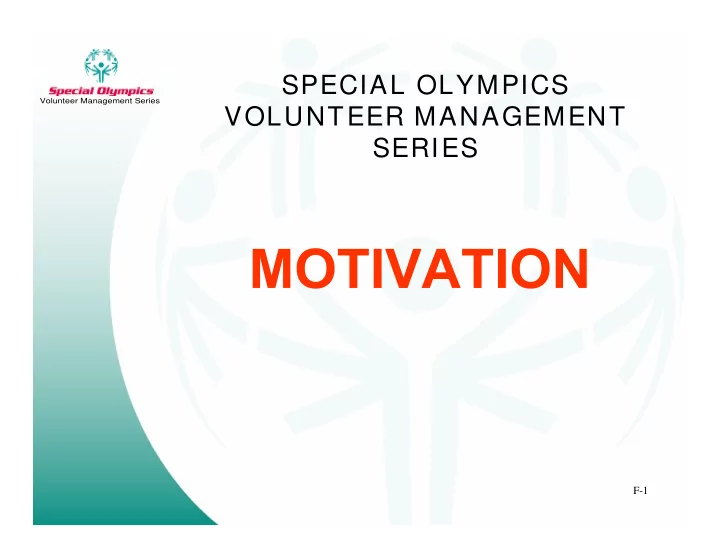

SPECIAL OLYMPICS Volunteer Management Series VOLUNTEER MANAGEMENT SERIES F-1
Int roduc t ory Ex erc ise Volunteer Management Series Recall your motivations for volunteering with Special Olympics. Did the Program recognize and appreciate your motivational needs? If so, how? F-2
Init ial Observat ions about Mot ivat ion Volunteer Management Series People are motivated to volunteer by a great variety of reasons One person s nightmare could be another s dream Many organizations never ask why a person is volunteering. When your motivational needs are cared for, you will most likely continue to volunteer. F-3
Learning Objec t ives: Mot ivat ion Volunteer Management Series Understand that success in volunteer programs involves matching a Program s needs with a volunteer s ability and motivation Explore the variety of reasons that people volunteer Determine one s personal motivational style and its impact on job placement, supervision and recognition preferences Examine motivation theory in light of your Program s ability to attract and retain volunteers F-4
K ey Conc ept s Volunteer Management Series 1. Success occurs with the simultaneous meeting of the needs of the staff, the Program and the volunteer 2. Many Special Olympics Programs need to update their understanding of who volunteers are and why they contribute time 3. Understanding different motivational styles can lead to more effective job placement, supervision, and recognition 4. Retention of volunteers is enhanced by recognizing their changing motivational needs F-5
Volunteer Management Series K ey Conc ept #1 Success occurs with the simultaneous meeting of the needs of the staff, the Program and the volunteer F-6
Mc Clelland Theory of Mot ivat ion Volunteer Management Series The theory is based on the premise that there are three primary motivators of human behavior: Achievement Affiliation Power/influence F-7
If t he job fit s Volunteer Management Series What type of Special Olympics job seems best suited for each personality type? F-8
Summary Points Volunteer Management Series Special Olympics needs people with a variety of motivational styles to achieve our goals. Some conflicts arise between those with different motivational styles. It is helpful to openly recognize and appreciate the difference rather than using them as a source of conflict. F-9
Summary Points (Continued) Volunteer Management Series Special Olympics must get creative in thinking through the challenge of meeting the variety of needs and style of volunteers. Determine what motivation people might have, examine their response to non - directive questioning such as: What jobs have you enjoyed most? Least? Describe an ideal supervisor. F-10
K ey Conc ept #2 Volunteer Management Series Retention of volunteers is enhanced by recognizing their changing motivational needs. F-11
Changing Mot ivat ional Needs Volunteer Management Series Important question to ask: What can we as a Program do to keep you involved as a volunteer in Special Olympics? You are very important to us and we sense your interest is waning. F-12
K ey Conc ept #3 Volunteer Management Series Success in your volunteer program occurs with the simultaneous meeting of the needs of Special Olympics and our volunteers. F-13
Sat isfying Everyone s Needs Volunteer Management Series What are some of the impacts of the following: The volunteer s needs are being met, but the needs of the Program are not being met The needs of the Program are being met, but those of the volunteer are not F-14
K ey Conc ept #4 Volunteer Management Series Many motivational issues/problems are rooted in the Program s need to update its understanding of who volunteers are and why they contribute their time. F-15
How is Volunt eer Mot ivat ion Volunteer Management Series Changing? Expanding motivations for volunteering: making a difference training or educational requirements business contacts socialization leadership opportunities F-16
How is Volunt eer Mot ivat ion Volunteer Management Series Changing? (c ont inued) Challenges to volunteering: flexibility short term preferred family and group activities volunteers respond to causes F-17
This document was created with Win2PDF available at http://www.daneprairie.com. The unregistered version of Win2PDF is for evaluation or non-commercial use only.
Recommend
More recommend